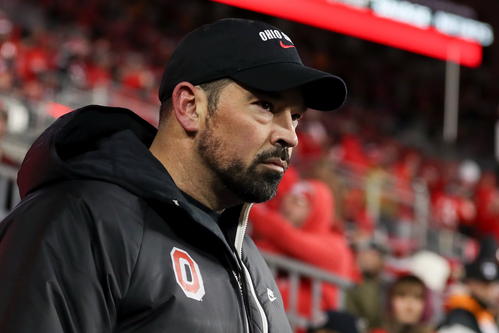Ryan Day Backs Playoff Reform Favoring Big Ten

Columbus, OH — Ohio State head football coach Ryan Day is voicing strong support for a College Football Playoff model that would guarantee the Big Ten at least four automatic qualifying spots, signaling a growing push from the conference’s top programs to reshape the postseason landscape.
Speaking publicly on the issue for the first time, Day called the proposed format both “fair” and “necessary” in light of the Big Ten’s recent expansion and rising competitiveness. With powerhouse additions like USC, UCLA, Oregon, and Washington joining the league, Day argues the Big Ten deserves multiple guaranteed berths in a playoff that now features 12 teams.
“This league is going to be too strong and too deep to not have a significant presence in the postseason,” Day said. “There needs to be a structure that reflects the reality of where college football is headed.”
Under the current format, the playoff field includes the five highest-ranked conference champions and seven at-large bids, but does not guarantee specific representation from any single conference. The Big Ten and SEC, both expanding and dominating national recruiting, are expected to advocate for changes that would secure them more consistent playoff access.
Day’s comments echo sentiments from other conference leaders who believe that without automatic qualifiers, top-tier teams could be left out due to internal cannibalization in deep leagues.
“There’s no doubt we’re going to beat each other up in this league,” Day said. “But that shouldn’t keep four of the best teams in the country from having a shot at a national title.”
The proposal is expected to be a hot topic at upcoming conference and NCAA meetings, as the sport continues to adapt to realignment, revenue shifts, and a rapidly changing postseason structure.
Speaking publicly on the issue for the first time, Day called the proposed format both “fair” and “necessary” in light of the Big Ten’s recent expansion and rising competitiveness. With powerhouse additions like USC, UCLA, Oregon, and Washington joining the league, Day argues the Big Ten deserves multiple guaranteed berths in a playoff that now features 12 teams.
“This league is going to be too strong and too deep to not have a significant presence in the postseason,” Day said. “There needs to be a structure that reflects the reality of where college football is headed.”
Under the current format, the playoff field includes the five highest-ranked conference champions and seven at-large bids, but does not guarantee specific representation from any single conference. The Big Ten and SEC, both expanding and dominating national recruiting, are expected to advocate for changes that would secure them more consistent playoff access.
Day’s comments echo sentiments from other conference leaders who believe that without automatic qualifiers, top-tier teams could be left out due to internal cannibalization in deep leagues.
“There’s no doubt we’re going to beat each other up in this league,” Day said. “But that shouldn’t keep four of the best teams in the country from having a shot at a national title.”
The proposal is expected to be a hot topic at upcoming conference and NCAA meetings, as the sport continues to adapt to realignment, revenue shifts, and a rapidly changing postseason structure.
